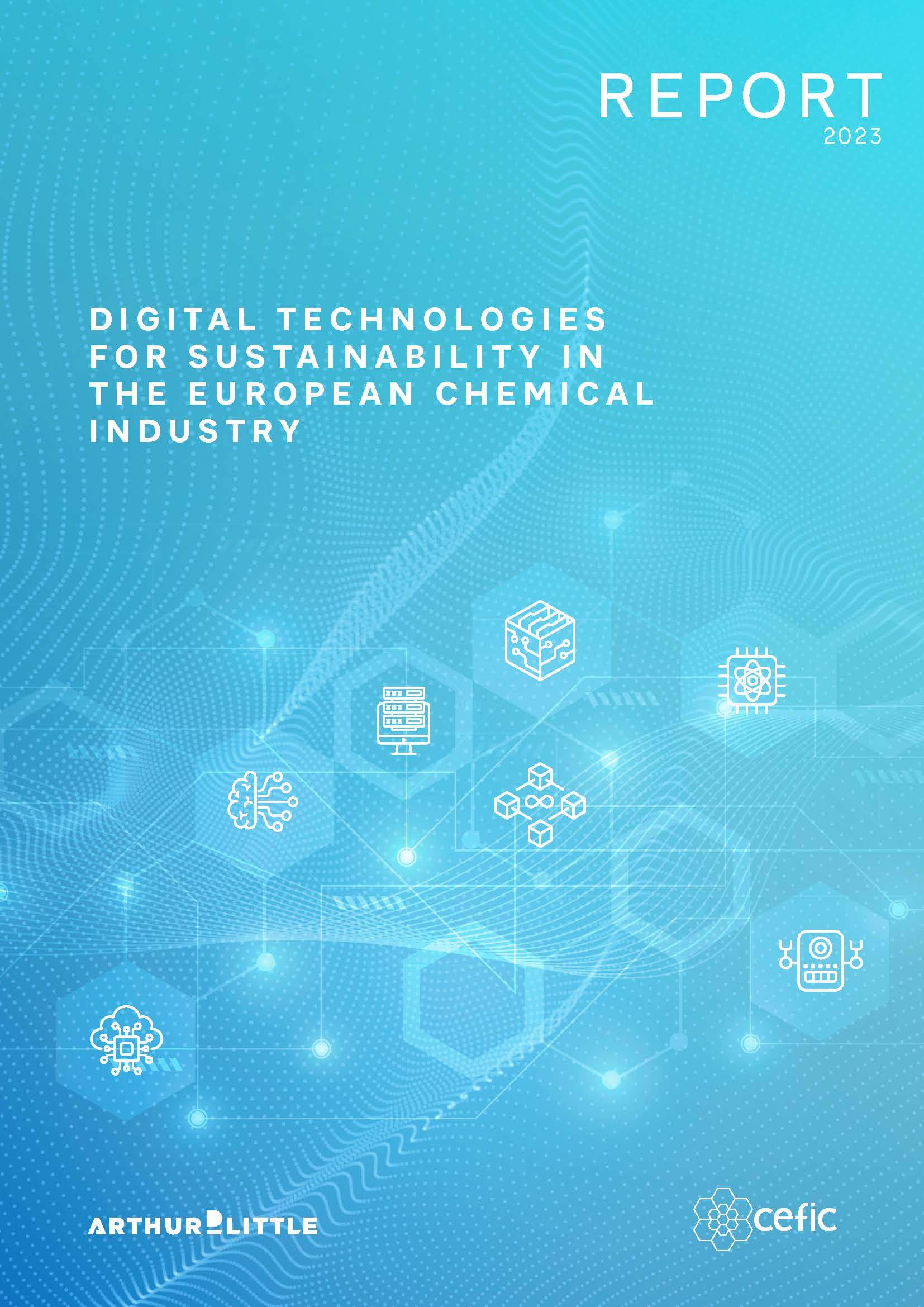4 min read • Chemicals, Technology & innovation management
New Report Offers A Blueprint For Overcoming Bottlenecks And Unlocking The Full Potential Of Digitalization In The Chemical Industry

Brussels, 19 April 2023
Digitalization has the power to transform the European chemical industry, revolutionizing the sector’s solutions and enabling a circular, more sustainable economy in line with the EU Green Deal objectives. This exciting potential is highlighted in a new report from Arthur D. Little and Cefic, the European Chemical Industry Council, which details how technologies like artificial intelligence, big data, Internet of Things, digital twins, robotics, virtual/augmented reality, and blockchain can accelerate the industry’s transformation.
The study titled “Digital Technologies for Sustainability in the European Chemical Industry“, is the first-ever attempt to outline how these technologies are used in the chemical sector and how they can be scaled up to make the chemical industry’s processes and products more sustainable.
Dr. Daniel Witthaut, Executive Director for Innovation at Cefic, emphasizes that while the EU chemical industry has already implemented digitalization in various applications, there is still much more that can be done:
“Digitalisation in the chemical industry is not new with multiple players already applying digital technologies in their fields. However, enormous opportunities exist for the industry to reach its sustainability goals faster through the application of the latest digital technologies – a journey that is just beginning for most players. And this is where we also need to work more closely with EU institutions to remove existing bottlenecks, improve data sharing and create a larger pool of homegrown talent to implement all these new technologies”.
According to the research, digital technologies can make the greatest contribution in five priority areas in both large and small companies in the EU:
- process design and production for climate and circularity objectives,
- sustainability assessment,
- enabling materials and chemicals circularity through tracking and tracing,
- sustainable product design, and
- safe and efficient logistics and distribution.
Dr. Michaël Kolk, Managing Partner at ADL, adds:
“Chemical companies in Europe are not only working on their own sustainability objectives but also providing solutions that serve as enablers for many downstream industries to reach their own. The picture is complex, but we believe that collaboration via greater digitalization is the way forward.”
Challenges to implementing digital tech in the EU chemical industry
The report also highlights a number of challenges that must be addressed to fully realize the potential of digital technologies. These include technological challenges such as data availability, interoperability, standardization, and cybersecurity as well as reluctance among companies to share data, financial costs, organizational issues, and a shortage of digital skills in the workforce. Greater collaboration between EU institutions and the chemical industry will be needed to address some of these bottlenecks.
About the report
Arthur D. Little and the European Chemical Industry Council (Cefic) joined forces to prepare this report, which summarises the views of digital technology experts from within and outside the chemical industry.
Recommendations from this report are based on the result of 15 individual interviews with senior digital and sustainability experts (e.g., chief digital officers or chief sustainability officers) as well as a survey of more than 70 experts from 50 companies that are broad representatives of the chemical industry in terms of type of business, size, and region.
To add cross-industry perspectives, the study also took into account input from more than 10 globally recognized digital technology experts outside the chemical industry.
About Cefic
Cefic, the European Chemical Industry Council, founded in 1972, is the voice of large, medium, and small chemical companies across Europe, which provide 1.2 million jobs and account for approximately about 15% of world chemicals production.
About Arthur D. Little
Arthur D. Little has been at the forefront of innovation since 1886. We are an acknowledged thought leader in linking strategy, innovation, and transformation in technology-intensive and converging industries. We navigate our clients through changing business ecosystems to uncover new growth opportunities. We enable our clients to build innovation capabilities and transform their organizations.
Our consultants have strong practical industry experience combined with excellent knowledge of key trends and dynamics. ADL is present in the most important business centers around the world. We are proud to serve most of the Fortune 1000 companies, in addition to other leading firms and public sector organizations.

4 min read • Chemicals, Technology & innovation management
New Report Offers A Blueprint For Overcoming Bottlenecks And Unlocking The Full Potential Of Digitalization In The Chemical Industry

DATE

Brussels, 19 April 2023
Digitalization has the power to transform the European chemical industry, revolutionizing the sector’s solutions and enabling a circular, more sustainable economy in line with the EU Green Deal objectives. This exciting potential is highlighted in a new report from Arthur D. Little and Cefic, the European Chemical Industry Council, which details how technologies like artificial intelligence, big data, Internet of Things, digital twins, robotics, virtual/augmented reality, and blockchain can accelerate the industry’s transformation.
The study titled “Digital Technologies for Sustainability in the European Chemical Industry“, is the first-ever attempt to outline how these technologies are used in the chemical sector and how they can be scaled up to make the chemical industry’s processes and products more sustainable.
Dr. Daniel Witthaut, Executive Director for Innovation at Cefic, emphasizes that while the EU chemical industry has already implemented digitalization in various applications, there is still much more that can be done:
“Digitalisation in the chemical industry is not new with multiple players already applying digital technologies in their fields. However, enormous opportunities exist for the industry to reach its sustainability goals faster through the application of the latest digital technologies – a journey that is just beginning for most players. And this is where we also need to work more closely with EU institutions to remove existing bottlenecks, improve data sharing and create a larger pool of homegrown talent to implement all these new technologies”.
According to the research, digital technologies can make the greatest contribution in five priority areas in both large and small companies in the EU:
- process design and production for climate and circularity objectives,
- sustainability assessment,
- enabling materials and chemicals circularity through tracking and tracing,
- sustainable product design, and
- safe and efficient logistics and distribution.
Dr. Michaël Kolk, Managing Partner at ADL, adds:
“Chemical companies in Europe are not only working on their own sustainability objectives but also providing solutions that serve as enablers for many downstream industries to reach their own. The picture is complex, but we believe that collaboration via greater digitalization is the way forward.”
Challenges to implementing digital tech in the EU chemical industry
The report also highlights a number of challenges that must be addressed to fully realize the potential of digital technologies. These include technological challenges such as data availability, interoperability, standardization, and cybersecurity as well as reluctance among companies to share data, financial costs, organizational issues, and a shortage of digital skills in the workforce. Greater collaboration between EU institutions and the chemical industry will be needed to address some of these bottlenecks.
About the report
Arthur D. Little and the European Chemical Industry Council (Cefic) joined forces to prepare this report, which summarises the views of digital technology experts from within and outside the chemical industry.
Recommendations from this report are based on the result of 15 individual interviews with senior digital and sustainability experts (e.g., chief digital officers or chief sustainability officers) as well as a survey of more than 70 experts from 50 companies that are broad representatives of the chemical industry in terms of type of business, size, and region.
To add cross-industry perspectives, the study also took into account input from more than 10 globally recognized digital technology experts outside the chemical industry.
About Cefic
Cefic, the European Chemical Industry Council, founded in 1972, is the voice of large, medium, and small chemical companies across Europe, which provide 1.2 million jobs and account for approximately about 15% of world chemicals production.
About Arthur D. Little
Arthur D. Little has been at the forefront of innovation since 1886. We are an acknowledged thought leader in linking strategy, innovation, and transformation in technology-intensive and converging industries. We navigate our clients through changing business ecosystems to uncover new growth opportunities. We enable our clients to build innovation capabilities and transform their organizations.
Our consultants have strong practical industry experience combined with excellent knowledge of key trends and dynamics. ADL is present in the most important business centers around the world. We are proud to serve most of the Fortune 1000 companies, in addition to other leading firms and public sector organizations.



